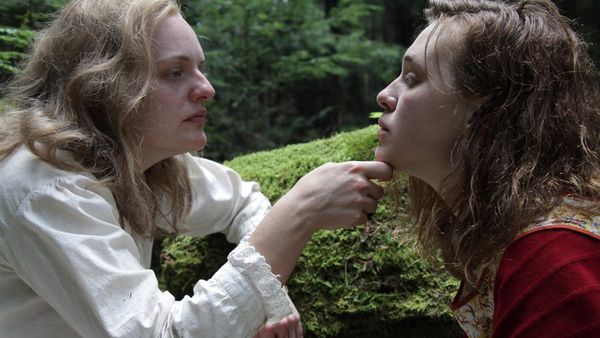Eye For Film >> Movies >> Shirley (2020) Film Review
Shirley
Reviewed by: Amber Wilkinson

Director Josephine Decker has always loved off-kilter psychodrama, from her debut Butter On The Latch and swift follow up Thou Wast Mild And Lovely to her accomplished study of a young woman on the brink Madeline's Madeline. This snapshot of the life of horror writer Shirley Jackson (The Lottery, The Haunting Of Hill House) is in many ways the perfect fit as it is based on Shirley: A Novel by Susan Scarf Merrell, a book that stitches its biographical detail into a fictional framework, providing the sort of real/unreal borderlands that Decker has proved so adept at navigating.
It's the Sixties, and Shirley (Elisabeth Moss) is at the height of her fame (or infamy) having caused a stir in certain circles with her macabre short story The Lottery, when her English professor husband Stanley Edgar Hyman (Michael Stuhlbarg) hires young academic Fred Nemser (Logan Lerman) as his assistant. Fred arrives at his Vermont house - an almost Gothic pile, wreathed in ivy - with his wife Rose (Odessa Young) and the pair are quickly convinced to move in and help the older couple.

The dynamic is disturbing from the off. Shirley is agoraphobic and and depressive - her obsession with writing further fuelled by Stanley, who despite his bon vivant air has a sinister predatory edge in all his interactions. Rose, meanwhile, is a bright, young thing, whose very naivety proves a magnet for Shirley, who is struggling with her latest work.
Cinematographer Sturla Brandth Grøvlen - best known for the audacious single-take film Victoria - makes you forget much of the action is behind closed doors by employing a beguiling, drifting camerawork, while the script by Sarah Gubbins moves from arch, wine-fuelled conversations round the dinner table to Shirley's more gauzy imaginings about Rose and the novel, concerning a young girl's disappearance, she is working on. Decker achieves a balance between the real and the imagined that mixes dark humour with more unsettling considerations of the quartet's relationship.
The film is awash with the sexual politics of the period, in particular the way that Fred and Stanley employ different, but equally toxic, modes of control over their spouses. But this a broader consideration of manipulation of all sorts, from the patriarchal miasma created by Stanley to the way in which Shirley uses, and possibly, exaggerates, her problems in order to get what she wants from those around her. Moss has rarely, if ever, been better than here, playing Shirley like an unpredictable force of nature. She gets firm support from Stuhlbarg, who injects Stanley with just the right amount of sinister shading and Young's nuanced reaction to the madness surrounding her character, even if Lerman's Fred rather fades out in the face of the other three.
Like Decker's previous outings, this is as much about the psychological landscape and evoking the mindset of its central character as it is about any physical interactions Shirley may have had. Before, it often felt as though Decker was drifting off onto self-indulgent tangents but her latest feels much more under control, with those tangents a fully fledged part of the portrait. The unsettling atmosphere is further driven by jangling sound design and a score full of agitated strings from Tamar-kali (Mudbound). By the end, you might not know exactly what Shirley did with her life, but you can certainly feel how she lived it.
Reviewed on: 18 Feb 2020















